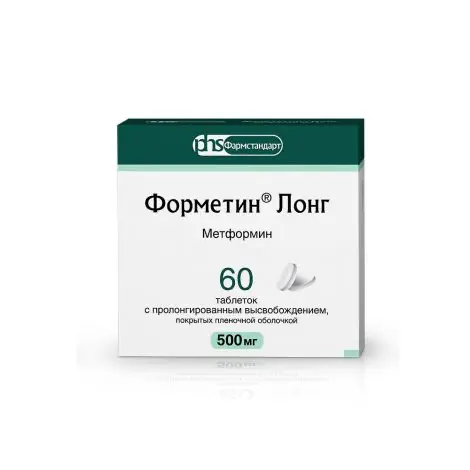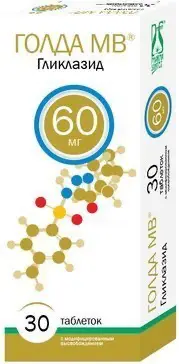Description
Glibenclamide+Metformin Pharmacodynamics
The drug is a fixed combination of two oral hypoglycemic agents of different pharmacological groups: metformin and glibenclamide. Metformin belongs to the group of biguanides and reduces both basal and postprandial plasma glucose levels. Metformin does not stimulate insulin secretion and therefore does not cause hypoglycemia.
It has 3 mechanisms of action:
– Reduces glucose production by the liver by inhibiting gluconeogenesis and glycogenolysis;
– increases the sensitivity of peripheral receptors to insulin, glucose consumption and utilization by cells in muscles;
– delays glucose absorption in the gastrointestinal tract (GIT).
Metformin also has a favorable effect on blood lipid composition, reducing the concentration of total cholesterol, low-density lipoproteins (LDL) and triglycerides. Glibenclamide belongs to the group of sulfonylurea derivatives of II
generation. Glucose content when taking glibenclamide is reduced as a result of stimulation of insulin secretion by pancreatic β-cells. Metformin and glibenclamide have different mechanisms of action, but mutually complement the hypoglycemic activity of each other. The combination of two hypoglycemic agents has a synergistic effect with respect to blood glucose reduction.
Indications
Type 2 diabetes mellitus in adults:
– When diet therapy, exercise, and prior monotherapy with metformin or derivatives are ineffective
sulfonylurea derivatives;
– for replacement of previous therapy with two drugs (metformin and sulfonylurea derivatives) in patients with stable and well-controlled glycemia levels.
Contraindications
– Hypersensitivity to metformin, glibenclamide or other sulfonylurea derivatives or excipients;
– diabetes mellitus type 1;
– diabetic ketoacidosis, diabetic precoma, diabetic coma;
– renal insufficiency or impaired renal function (creatinine clearance less than 60 ml/min);
– leukopenia;
– severe insufficiency of the adrenal cortex;
– acute conditions that can lead to changes in renal function: dehydration, severe infection, shock;
– use for less than 48 hours before and for 48 hours after radioisotopic or radiological studies with iodine-containing contrast agents;
– Acute or chronic diseases accompanied by tissue hypoxia: cardiac or respiratory insufficiency, recent myocardial infarction, shock;
– hepatic insufficiency;
– porphyria;
– Pregnancy, breastfeeding;
– children under 18 years of age;
– concomitant use of miconazole;
– major surgical operations and injuries when insulin therapy is indicated (see section “Special indications”);
– disorders of food and drug absorption in the gastrointestinal tract (including intestinal obstruction, intestinal paresis);
– chronic alcoholism, acute alcohol intoxication;
– lactoacidosis (including history);
– compliance with hypocaloric diet (less than 1000 kcal/day);
– concomitant use with bozentan.
Caution
In patients aged more than 60 years old who perform heavy physical work, due to increased risk of lactoacidosis; in febrile syndrome, thyroid disease (with dysfunction), insufficiency of anterior pituitary gland or adrenal cortex; in elderly patients because of the risk of hypoglycemia; in glucose-6-phosphate dehydrogenase deficiency; in the first weeks of treatment (increased risk of hypoglycemia); in the presence of risk factors for hypoglycemia.
Administration during pregnancy and lactation
It is contraindicated during pregnancy.
The patient should be warned that during treatment with Glibenclamide + Metformin, it is necessary to inform the physician about the planned pregnancy and the onset of pregnancy. If a pregnancy is planned, or if pregnancy occurs while taking Glibenclamide + Metformin, the drug should
should be discontinued and insulin therapy should be prescribed.
Glibenclamide + Metformin is contraindicated during breastfeeding, since there is no data on the ability of glibenclamide to penetrate into breast milk.
Dosage and administration
- The drug dose is determined by the physician individually for each patient, depending on the level of glycemia.
- The initial dose is 1 tablet (2.5 mg + 500 mg or 5 mg + 500 mg) of Glibenclamide + Metformin once daily. To avoid hypoglycemia, the starting dose should not exceed the daily dose of glibenclamide (or the equivalent dose of another previously taken sulfonylurea drug) or metformin if they have been used as first-line therapy. It is recommended that the dose be increased by no more than 5 mg of glibenclamide + 500 mg of metformin per day every 2 or more weeks to achieve adequate glycemic control.
Substitution of prior combination therapy with metformin and glibenclamide: The starting dose should not exceed the daily dose of glibenclamide (or equivalent dose of another sulfonylurea drug) and metformin taken previously. Every 2 or more weeks after the start of treatment, the dose of the drug is adjusted according to the level of glycemia. - The maximum daily dose is 4 tablets of Glibenclamide + Metformin at a dose of 5 mg + 500 mg or 6 tablets at a dose of 2.5 mg + 500 mg.
- Dosing regimen
The dosing regimen depends on the individual prescription: - For 2.5 mg + 500 mg and 5 mg + 500 mg doses:
Once daily, in the morning during breakfast, when 1 tablet per day is used.
Twice a day, in the morning and evening, when using 2 or 4 tablets a day. - For a dosage of 2.5 mg + 500 mg:
Three times daily, morning, afternoon, and evening, when 3, 5, or 6 tablets per day are used. - For 5 mg+500 mg dosage:
Three times daily, morning, afternoon, and evening, when 3 tablets per day are used.
The tablets should be taken with meals. Each intake of the drug should be accompanied by a meal high enough in carbohydrates to prevent hypoglycemia. - Administration in elderly patients
The dose of the drug is chosen on the basis of the state of kidney function.
The initial dose should not exceed 1 tablet of Glibenclamide + Metformin (2.5 mg + 500 mg). Regular assessment of renal function is necessary. - Administration in children The use of Glibenclamide + Metformin is contraindicated in children.





